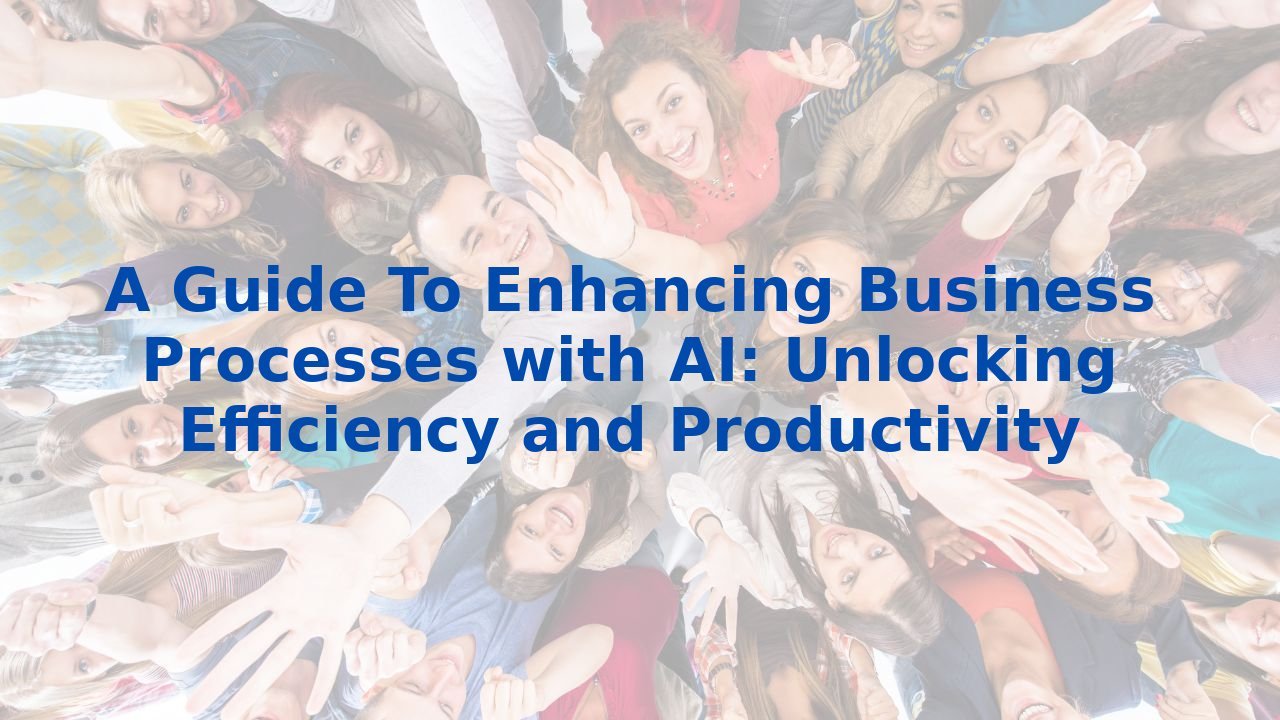A Guide To Enhancing Business Processes with AI: Unlocking Efficiency and Productivity
A Guide To Enhancing Business Processes with AI: Unlocking Efficiency and Productivity
Introduction
In the relentless pursuit of efficiency, organizations today are adopting innovative solutions that redefine their operational landscapes. One of the most revolutionary advancements in this domain is Artificial Intelligence (AI). With the power to analyze vast datasets, automate mundane tasks, and optimize decision-making, AI is no longer just a futuristic concept—it's a present reality shaping the way businesses function.
Understanding Business Process Management
At its core, Business Process Management (BPM) involves systematically managing an organization's processes to enhance efficiency, reduce costs, and improve quality. Emerging as a crucial discipline in the late 1980s, BPM has transformed dramatically with the integration of advanced technologies like AI. Companies are realizing that just as order is important in a well-flowing river, orderly processes are crucial for a thriving business. AI enhances that order.
How AI Enhances Business Processes
The landscape of business processes is broad, but AI brings a suite of tools that can significantly elevate several key areas:
Process Discovery and Mapping
AI excels in process mining and pattern recognition. By uncovering the intricacies of existing operations, AI creates detailed and accurate process maps. Imagine having a dynamic blueprint of your processes rather than static representations—this reduces the reliance on manual data analysis and offers a living, breathing view of operations.
Process Automation
Gone are the days when every operation required human intervention. AI can automate repetitive tasks—think data entry, invoice processing, and document management. This not only drastically cuts down on errors but also liberates valuable time for your workforce, allowing them to focus on strategic initiatives that drive growth.
Real-Time Monitoring and Optimization
With AI, organizations gain the capability to monitor processes in real-time. This means throttling bottlenecks and optimizing workflows as they occur. By leveraging historical data along with real-time inputs, AI can foresee potential issues, enabling businesses to pivot swiftly and maintain smooth operations.
Decision Support
In an era rich with data, decision-making can be overwhelming. AI alleviates this burden by providing not just information but also simulations of alternative scenarios. This empowers your teams to make informed decisions, weighing potential risks against likely outcomes, thus enhancing leadership efficacy.
Predictive Analytics
What if you could anticipate challenges before they arise? AI’s predictive analytics enable organizations to examine historical data, unveil patterns, and forecast future trends. This proactive approach ensures that businesses can tackle issues before they evolve into significant setbacks.
Benefits of AI in Business Process Management
The integration of AI into BPM manifests in diverse benefits:
- Improved Efficiency: With automation of routine tasks, businesses see a significant reduction in manual effort and errors.
- Enhanced Decision-Making: AI’s data-driven insights foster better decision-making through predictive modeling and root cause analysis.
- Increased Productivity: As AI handles repetitive tasks, employees can direct their energies toward high-value activities, amplifying overall productivity.
- Better Risk Management: AI acts as a sentinel, identifying potential risks and enabling proactive strategies.
- Enhanced Customer Experience: By analyzing customer interactions and feedback, AI optimizes service processes, enriching customer satisfaction and loyalty.
The Role of Employee Training in AI Integration
While the capabilities of AI are staggering, their potential can only be fully realized when employees are equipped to utilize these tools effectively. Consider the following points:
- Understanding AI Tools: Knowledge of how AI functions and integrates with business processes is essential.
- Data Analysis Skills: Employees must feel confident in interpreting AI-generated insights to make meaningful contributions.
- Adaptability: A culture that embraces new technology ensures smoother transitions to AI-enhanced workflows.
- Continuous Learning: Organizations should foster ongoing learning initiatives to keep employees abreast of the latest AI advancements and best practices.
Conclusion
The integration of AI into business processes is more than a trend—it is a profound shift that holds the potential to revolutionize how organizations operate. From process discovery to automation, real-time monitoring to enhanced decision-making, AI empowers companies to transform their operations decisively.
As organizations embark on this transformative journey, investing in training will be pivotal. By arming employees with the necessary skills to harness AI effectively, businesses can genuinely unlock a new level of efficiency and productivity. In an increasingly competitive market, the proactive embrace of AI may very well be the difference between merely surviving and truly thriving.



